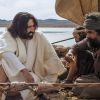One person considers one day more sacred than another; another considers every day alike. Each of them should be fully convinced in their own mind. Whoever regards one day as special does so to the Lord. Whoever eats meat does so to the Lord, for they give thanks to God; and whoever abstains does so to the Lord and gives thanks to God (Romans 14:5-6 NIV).
Black Friday approaches.
We're probably used to that part of Thanksgiving by now. (It's interesting that I just called it a "part of Thanksgiving," isn't it?) We're accustomed to retailers opening early on the Friday after Thanksgiving and having huge sales to kickstart the Holiday shopping season. Some shoppers line up before dawn to get the really great deals. Some stores have opened as early as midnight on Black Friday. And some of us who are, well, less shopping-inclined, wonder when they'll just start opening on Thanksgiving.
This year. That's when.
While it's probably happened before, it seems that this year a large number of retailers have decided to kick off the Black Friday feeding frenzy on Thanksgiving. And, no doubt, when the doors open the shoppers will come.
For some people, though, shopping on Thanksgiving just feels wrong. Thanksgiving's for being with family. Overeating. Sitting on the couch and watching football, and other high-minded pursuits like that. It's not for shopping, is it? Should it be?
 Maybe not, but some of the backlash seems a bit overblown as well. Over at Huffington Post, for instance, Jason Linkins refers to retailers open on Thanksgiving as "History's Greatest Monsters." Really? To (even implicitly) equate Thanksgiving shopping with the Holocaust, or Stalin's purges, or the Killing Fields? Might that be overstating the case just a tad? I won't be shopping on Thanksgiving — though, to be honest, it's not due to a more highly-developed sense of morality. (It's due more to the fact that I don't like shopping anytime.) I think retail workers who do have to work on Thanksgiving should be very well compensated. But I don't think the retailers who open their doors on Thanksgiving, nor the shoppers who walk through them, are monsters simply for doing so.
Maybe not, but some of the backlash seems a bit overblown as well. Over at Huffington Post, for instance, Jason Linkins refers to retailers open on Thanksgiving as "History's Greatest Monsters." Really? To (even implicitly) equate Thanksgiving shopping with the Holocaust, or Stalin's purges, or the Killing Fields? Might that be overstating the case just a tad? I won't be shopping on Thanksgiving — though, to be honest, it's not due to a more highly-developed sense of morality. (It's due more to the fact that I don't like shopping anytime.) I think retail workers who do have to work on Thanksgiving should be very well compensated. But I don't think the retailers who open their doors on Thanksgiving, nor the shoppers who walk through them, are monsters simply for doing so.
Human motives are complicated and messy. You might wonder how a person who considers Thanksgiving shopping monstrous spends the day. In prayer, giving thanks? Affirming and strengthening family relationships? Helping the poor? Or drinking too much, fighting with family, and yelling at football players on a TV screen? You might wonder about a person who shops on Thanksgiving. Have they lost the true meaning of the holiday? Are they too caught up in consumerism to be truly grateful for what they have? Or are they using the opportunity to be better stewards of their resources by trying to save some money? Are they enjoying the company of family and friends at the mall? Will they come home and thank God for blessing them with the means to buy gifts for the people they love?
Is it monstrous, or even just a little wrong, to shop on Thanksgiving? It might be a matter of gratitude, mightn't it?
Long before there was a Thanksgiving holiday, or a debate over whether the open-air market should be open on it, a diverse bunch of Christians in Rome had a similar set of questions. The particulars were different: should all Christians observe Jewish food laws and holy days? Or did worrying over those observances betray a lack of faith and freedom in Jesus? Not surprisingly, the answer to that question might rest heavily on your heritage and background. Jewish Christians might say the food laws and holy days came from God, and look down on Christians who didn't observe them as pagans. Gentile Christians might claim food laws and holy days had been superseded by faith in Jesus, and that Christians who insisted on observing them were weak in their faith and in bondage to a law that Jesus had annulled.
In his letter to the church at Rome, however, Paul doesn't give a quick and easy answer. He suggests, instead, that they've missed the point. "Observe the law, or don't," Paul writes to them. "Whichever side of the fence you come down on, as long as you're giving thanks to God you're on the right side."
If we asked Paul about going to the mall on Thanksgiving, I think he'd say, "What's a mall?" And if we explained the concept of a mall to him, then I think he'd say, "What's Thanksgiving?" But then, after we explained all that, I think he'd say much the same thing he said to those Christians in Rome way back then. "Do what seems right to you, and give thanks to God while you do it. And you might find you aren't on opposite sides after all."
Hopefully, we'll remember that when the issue isn't whether or not to hit the mall on Turkey Day. Maybe we'll remember it even when there's no argument to be won, no ideological ground to defend, when it's just God and us. Maybe we'll remember that sometimes the best way to decide what to do in life is to do what our consciences say is right, and give thanks to God while we do it.
For believers, Thanksgiving shouldn't be just a holiday. It should be the attitude with which we approach everything in life. Thanksgiving "consecrates" what we do, Paul writes elsewhere. Our lives become holy ground when we develop the habit of giving thanks to God.
So go to work on Monday, and consecrate your workplace to God by giving thanks. Give thanks for your colleagues, for the work you have to do, for the benefits you get from it. Go to school, and give thanks for your classmates, your opportunities to grow, your teachers who give of themselves to help you learn. Give thanks for your spouse, your kids, your parents, and consecrate your home and family to the Lord. Give thanks for your friendships, for your church…set them apart as holy ground, fit for God's presence.
Give thanks for your friendships, for your church…set them apart as holy ground, fit for God's presence.
And, yes, go to the mall on Thanksgiving, if you choose. Give thanks for the prosperity you enjoy, for the people who help you, for the people for whom you're buying. Give thanks, and consecrate that mall for God.
I'll be home, consecrating my TV screen.
Happy Thanksgiving!









Reader Comments
Archived Facebook Comments